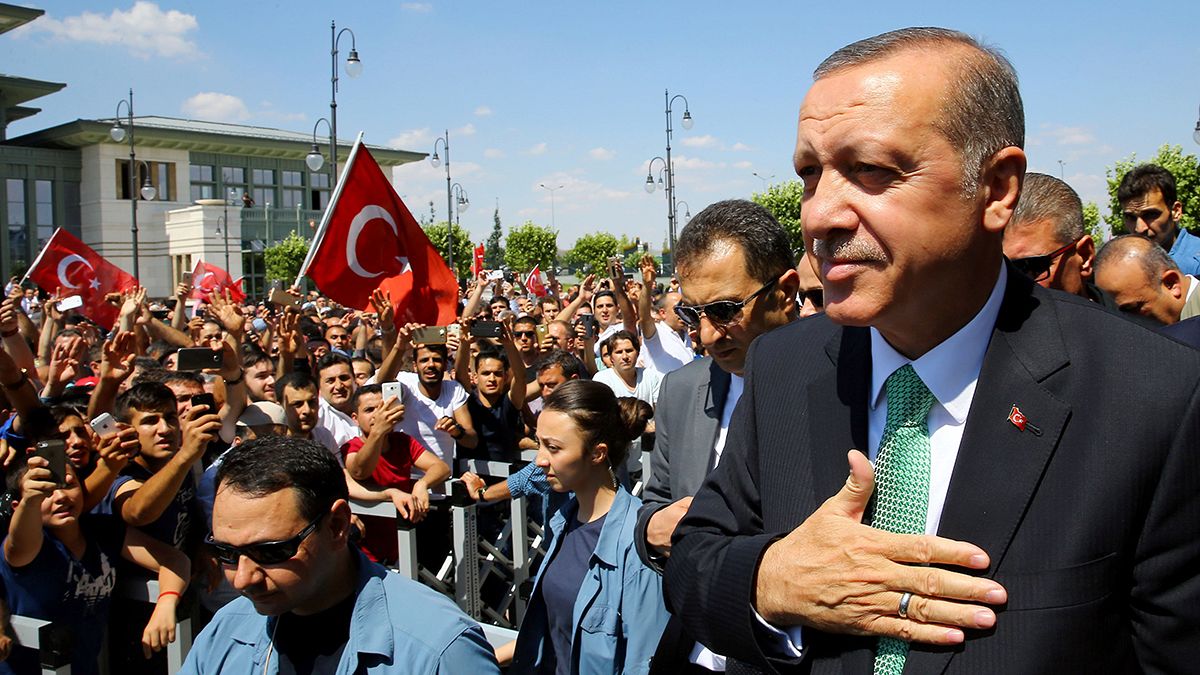Ankara says the measures are necessary to ensure stability. But concerns are being voiced about the protection of fundamental rights and freedoms.
The crackdown is intensifying in Turkey, following a failed coup attempt over a week ago.
The legal limit for detention without charge has now been extended from four days to 30.
It comes after a state of emergency was brought in during the week.
An estimated 60,000 public employees have also been detained or suspended.
Ankara says the measures are necessary to ensure stability. However, concerns have been voiced about the protection of fundamental rights and freedoms.
President Recep Tayyip Erdogan has also ordered the closure of thousands of private schools and charities alleged to be linked to the US-based Muslim cleric, Fethullah Gulen.
Military restructuring
A restructuring of Turkey’s once-untouchable military has also come a step closer.
A planned meeting of the military council has been brought forward.
Private broadcaster NTV reported that Turkey’s military council will meet under Erdogan’s supervision on July 28, a few days earlier than planned.
The meeting, which normally takes place every August at the headquarters of the military’s General Staff, will this time be held in the presidential palace.
Speaking in an interview with the Reuters press agency on Thursday, Erdogan said he planned to restructure the armed forces and bring in “fresh blood”.
Meanwhile, on Saturday, more than a thousand army soldiers detained in the wake of the July 15 coup were released.
They have been described as “low-ranking”.
Thousands of service personnel are still being held.
After the putsch, the purges
The Turkish authorities have already launched a series of purges of the armed forces, police, judiciary and education system.
They target the followers of Fetullah Gulen, a US-based Turkish cleric who operates an extensive network of schools and charitable foundations in Turkey and overseas.
The first decree authorises the closure of:
- 1,229 charities and foundations
- 19 trade unions
- 15 universities
- 35 medical institutions
Parliament must approve the decree but this only requires a simple majority, which the governing AK Party has.
Additionally, more than 60,000 soldiers, police, judges, teachers and civil servants have been suspended, detained or placed under investigation in the past week.
Who is Fethullah Gulen?
Erdogan has accused the US-based Muslim preacher Fethullah Gulen of masterminding the coup.
Gulen denies the accusation and has condemned the uprising.
Ankara says it will have completed a dossier requesting the 75-year-old’s extradition from the United States within the next ten days.
Washington says there will need to be clear evidence of Gulen’s involvement in the coup before it can agree to extradite him.
Lawyers predict that could take a long time.
Gulen left Turkey for the US in 1999.
Gulen’s nephew was reportedly detained in Turkey on Saturday, according to the AFP news agency.
#BREAKING Turkey detains Gulen's nephew after attempted coup: state media
— AFP news agency (@AFP) July 23, 2016
Turkey’s state of emergency
President Erdogan declared a state of emergency on Wednesday.
He said it would enable the authorities to root out those who masterminded and supported a failed coup over a week ago.
It allows the government to:
- Pass laws without parliamentary support
- To curtail or suspend civil rights and liberties as they see fit
Turkey has also suspended the European Convention on Human Rights (ECHR).
What they are saying
After the coup, Western countries pledged support for democracy in Turkey. However, strong concern has also been expressed over the extent of the subsequent purges of state institutions.
Speaking at a meeting of the G20 finance ministers and central bankers in China on Saturday, Turkey’s Deputy Prime Minister Mehmet Simsek said his country will adhere strongly to democratic principles and the rule of law.
